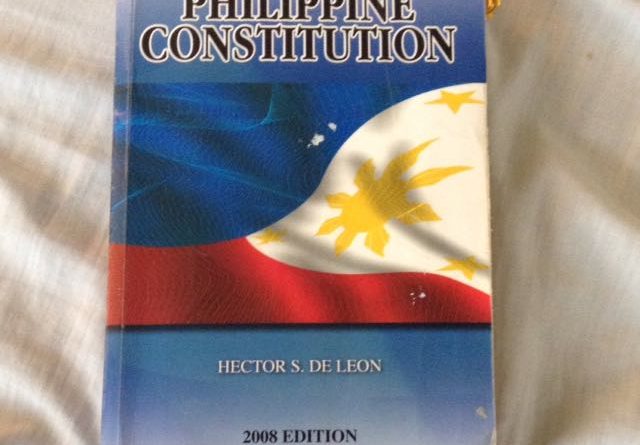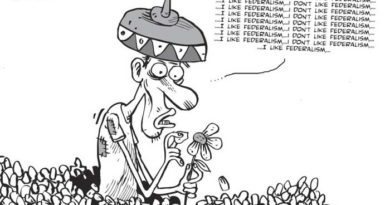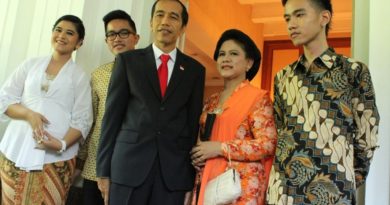Op-Ed Column: Opinion on Page One By Francisco Tatad – Just who do they think they are?
THE Constitution, otherwise known as the fundamental law of the land, is the only legislation that emanates directly from the people. Every other law comes from the will of Congress. The 1987 Constitution was crafted by a 50-member constitutional commission appointed by Cory Aquino, whom the military had installed as revolutionary president, after the February 1986 civilian-backed military uprising ousted Ferdinand Marcos. Absent any written provision governing the writing and adoption of a new Constitution, Mrs. Aquino was free to appoint 50 men and women to draft the needed document, which she later asked the electorate to ratify in a plebiscite.
It is a fairly decent Constitution, which provides for a democratic and republican government in which sovereignty resides in the people and all government authority emanates from them; guarantees the citizen’s basic rights and liberties, notably free speech, free expression, free press, freedom of assembly, freedom of religious belief and worship; and grants the state the power to defend itself against all threats and enemies. For this reason, some of its surviving signatories believe the Constitution, with all its imperfections, should never be tinkered with.
It is an understandable sentiment, but I believe it is excessively protective of the utterly fallible human document, and could prevent its most obvious flaws and defects from being seasonably corrected. Indeed, there are a number of areas where amendments and revisions are needed, and the most faithful defenders of the Constitution should be among the first to insist on their being revisited. The Constitution presumes it, and specifically provides for the correct way of doing it. This is found in Article XVII, entitled “Amendments or Revisions.”
The first legal barrier
I have repeatedly written about this, but it looks like I am engaged in a dialogue of the deaf. Still, at the risk of becoming a bore, I will have to restate my point, if it is the last time I will have to do it. I will quote Article XVII in full:
“Section 1. Any amendment to, or revision of, this Constitution may be proposed by: (1) The Congress, upon a vote of three-fourths of all its Members; or (2) A constitutional convention.
“Sec. 2. Amendments to this Constitution may likewise be directly proposed by the people through initiative upon a petition of at least twelve per centum of the total number of registered voters, of which every legislative district must be represented by at least three per centum of the registered voters therein. No amendment under this section shall be authorized within five years following the ratification of this Constitution nor oftener than once every five years thereafter.
“The Congress shall provide for the implementation of this right.
“Sec. 3. The Congress may, by a vote of two-thirds of all its Members, call a constitutional convention, or by a majority vote of all its Members, submit to the electorate the question of calling such a convention.
“Sec. 4. Any amendment to, or revision of, this Constitution under Section 1 hereof shall be valid when ratified by a majority of the votes cast in a plebiscite which shall be held not earlier than sixty days nor later than ninety days after the approval of such amendment or revision.
“Any amendment under Section 2 hereof shall be valid when ratified by a majority of the votes cast in a plebiscite which shall be held not earlier than sixty days nor later than ninety days after the certification by the Commission on Elections of the sufficiency of the petition.”
No role for DU30
Notice that the process of proposing amendments or revisions to the Constitution involves the Congress and the Filipino people only, without any mention whatsoever of the President. And yet it is the President who is at the very center of the proposal to amend, if not revise, the Constitution. He has unlawfully appointed a 22-member consultative commission to propose constitutional amendments, and this commission has just finished a “draft Constitution” for a Federal Republic of the Philippines, which he is expected to send to his rubber-stamp Congress.
To repeat, the President has no lawful business getting involved in any constitutional revision or amendment, and the former Chief Justice who heads the commission and the other “legal luminaries” in it all know this. They should have been the first ones to point it out, but they seemed more determined to serve the whimsy of this egocentric and constitutionally untethered President than defend the honor of the Constitution and the State.
Many of them are learned individuals for whom I used to have so much respect, but it pains me to have to ask them the same question I ask the President: “Just who do you think you are? How could you ever imagine proposing amendments to the Constitution when your very first act is to attack the basic rule by which the Constitution is to be amended?”
DU30 can’t copy Cory or Laurel
Had DU30 taken over the government in the same way Cory Aquino did in 1986, or had a foreign power invaded and occupied the Philippines, as Japan did in 1943, and a puppet regime like President Jose P. Laurel’s was ordered by the occupation forces to have the Constitution rewritten and introduce the most grievous nonsense into it, I would have found no reason to chafe against the puppet government.
But DU30 was democratically elected in 2016 (or so we believe) and has taken an oath to “faithfully and conscientiously fulfill (his) duties as President of the Philippines, preserve and defend its Constitution, execute its laws, do justice to every man, and consecrate (himself) to the service of the Nation.” He cannot take this meretricious shortcut without making the whole process of proposing constitutional amendments null and void ab initio. This is what former Chief Justice Reynato Puno and the entire commission should have promptly recognized, above and independent of their personal desires to see any specific revision of the Constitution and please and humor the clearly benighted President and Commander in Chief.
This is a time for men of integrity and patriotism to rise to the challenge, no matter the cost; they failed.
Does Article XVII exist or not?
I have no doubt I have quoted and understood Article XVII correctly. If any member of DU30’s Concom believes I have not, then I should like to hear them say so. But I don’t believe I have missed anything that has been revealed to only a few elect, beyond the letter and spirit of the written law. There are two issues here: the President’s direct and central involvement in proposing constitutional amendments in violation of Article XVII, and the specific amendments being proposed, in violation of reason and reality.
I have already discussed the first; I will now discuss the second.
The Concom’s draft of a federal Constitution proposes to “federalize” the Philippine unitary state into 18 federated regions — 16 federated regions including the new Negosanon region of Negros Oriental and Negros Occidental, and the federated regions of Bangsamoro and the Cordilleras. This is a madman’s flight from reason and reality.
Inverted federalism
According to Merriam-Webster English Language Learners Dictionary, to “federalize” is “to join (states, nations, etc.) together in or under a federal system of government.” Concrete illustration of this is every existing federal government in the world, from the United States, Germany, Canada, Switzerland, Australia, to Malaysia. The correct usage therefore is to federalize 18 regions into one federal union, and not to federalize one unitary state into 18 separate regions. The proper term for that opposite process would be balkanization, which means to divide the nation into smaller (mutually hostile) states or groups.
It is an inherent and irreconcilable intellectual contradiction, like holding that a square is in fact a circle, which no right-thinking mind can possibly latch upon. But since DU30 has openly proposed his dogma, no one has found the moral and intellectual courage to prostrate themselves before him and say, “Your Majesty, it sounds like a great idea, but as far as my poor brain can grasp it, it is all wrong.” Everyone proclaims how wonderfully gilded the self-anointed king from Davao is, but in fact the king has no clothes at all!
DU30’s ablest defenders have tried to justify his folly by saying he is merely trying to fulfill a promise he made during the presidential debates. Indeed, he promised to have the Constitution amended, in order to establish a federal system of government, just as he made so many other promises, which he has not bothered to fulfill at all. But for the reasons just cited, this was an election promise he was not expected to fulfill precisely because the Constitution did not allow him to propose any amendment, and his idea of federalism has long been buried by the constitutional reality of a Philippine unitary state. Finally, there is no popular clamor for federalism, assuming the public shared DU30’s misguided understanding of the concept, to which he had a duty to respond.
Not federal but parliamentary govt
The other presidential candidates and the people moderating the debate should have exposed DU30’s “promise” as nonsense, but they did not have the competence and courage to do so. Some of them sincerely shared DU30’s mistaken and unvetted view of federalism, just as some people in the ancient Emperor’s court mistakenly believed Simon the Magus could fly.
I cannot say how much real energy and passion the public has for real constitutional reform at this point. But assuming such energy and passion exist, these should now be redirected to address real maladies of the Constitution. As we have seen, the unitary state is not a problem for which the solution is an inverted federalism. But the presidential system under DU30 has become our most serious constitutional problem, and must be promptly and adequately dealt with.
It is time for our people, as the real authors of the Constitution, to start mulling our much-needed and long delayed shift to parliamentary government. Walter Bagehot, author of the classic The English Constitution, and extensively quoted in the BBC series, “The Crown,” is correct in saying that vis-à-vis the presidential system, the parliamentary system is the superior form of government. We have the opportunity to discover and confirm this for ourselves.
Although DU30 cannot lawfully become part of the process of constitutional change, he can, if he is so minded, help create the proper environment for a shift to parliamentary government. He could, for a start, stimulate the necessary conditions for a high-minded national debate. Thoughtful columnists could help enlighten the public by contributing to this discussion instead of wasting their time trying to burn incense for DU30 and his commissioners as they pursue their inverted federalism mischief.
ON
 All photographs, news, editorials, opinions, information, data, others have been taken from the Internet ..aseanews.net | [email protected] |.For comments, Email to :D’Equalizer | [email protected] | Contributor
All photographs, news, editorials, opinions, information, data, others have been taken from the Internet ..aseanews.net | [email protected] |.For comments, Email to :D’Equalizer | [email protected] | Contributor









